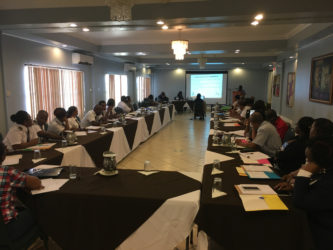The Government Analyst-Food and Drug Department (GA-FDD) hosted a sensitisation conversation yesterday to improve its relationship with customs officers.
Director of GA-FDD Marlan Cole addressed the customs officers and other representatives from the Guyana Revenue Authority at the activity and explained the functions of the GA-FDD in regulating the kinds of foods, drugs and cosmetics that are accepted into the country and sold on the market. The officers were also enlightened on the importation requirements for food, cosmetics and the GA-FDD stamps and signatories.
Cole told Stabroek News that the aim of the conversation with the officers is to “basically for us to candidly look at the situation and if there is a need for improvement and where energy should be concentrated.” He added that it was also expected to further highlight if the system and collaboration between the customs officers and the GA-FDD, that has been ongoing for decades, is working efficiently.

“We are seeing entries coming back to us that have not been flagged [marked by the FDD],” he said, while pointing out that from all indications it seems as if the system is currently working efficiently but there are always ways to improve. “What we want from the conversation is to assess where we are and where do we go from here…? How do we get there?” he added.
According to Cole, his agency’s performance is being stymied by its low staff complement. “It’s virtually impossible for seven food inspectors to be responsible for processing food entries alone and the plethora of documents that would come through on a daily basis,” Cole explained, while saying that the number would have to be doubled in order for the agency to carry out its mandate efficiently and effectively.
“We enjoy the support from the public health officers in the regions but we still have to take samples of water and food and deal with all the documents. It’s basically impossible for seven inspectors to do and the remuneration package is not attractive,” he said.
Cole explained that with 15 officers, the department would be able to divide them and five would be able to concentrate on imports, five on inspection and another five on the local industry. “We still have to inspect local factories and make sure that they are complying with the law,” he pointed out.
Cole also explained that because of its staff limitations, the GA-FDD is not able to ensure that there is an officer stationed at Customs to flag any shipment that is of interest to it. He explained that they have since written customs to not release entries that are related to the department unless it would’ve been stamped from the GA-FDD with all the necessary signatures.
He said that since the system has been in place, documents that are not stamped by FDD are being referred to the department before release by customs, which he dubbed as a “good development in the interest of all of us.”
Cole also highlighted that while there are roughly 600 importers around the country, about 50% of them are not registered with the department. “Sometimes a guy comes with a shipment then he registers,” he said.
He explained that while sometimes the importers feel that there is too much red tape, “there is no substitute to ensuring that a good product comes to the country and we have no excuse but to be true to our mandate.”




